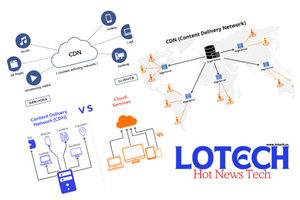Modern business cannot exist without content-oriented web applications for bloggers and content creators. These platforms need reliable hosting platforms for them to run effectively with no hitches as well as be able to load sufficiently and conveniently for the user. This paper aims to provide a review on the most suitable hosting technologies that are used on content centric web applications; with respect to cost, integrative, and effectiveness.
Content Driven Web Apps Dabei geht es um die Bedeutung von Content-Driven Web Apps und wie man diese am besten verstehen kann.
But to get straight into hosting solutions it is important to take a brief look at what it means to be a content-driven web app. These applications are driven mainly for delivering high content like articles, videos, pictures and other multimedia information to the users. While, transactional web apps are aimed towards processing the information, content driven web apps represent and consume content. Some of the most common are blog sites, news sites and online magazines.
Key Hosting Needs for Content-Driven Web Apps
1. Scalability
The moment you have more targeted visitors, your web app load increases as well. The great disadvantage of the centralized hosting model is that as the traffic grows, the page response time suffers. This is especially important for post and landing pages created for the product launch or any type of viral content, for example.
2. Performance
Quick loading time is friendly to the user base and also boosts the rankings of a site in a search engine. The hosting technologies should ensure that content is cached and sent to an audience by means of CDNs and that the servers are well managed.
3. Reliability
Availability is essential to content-based web applications. High reliability is expected from your hosting provider in that your audience should be able to access your content most of the time.
4. Security
With cases of cyber crimes increasing security has become paramount. The hosting solutions should be secure and the solutions should come with certifications, firewalls and backup.
5. Cost-Effectiveness
To many creators and SMBs, budget is a tremendous factor to consider. It is therefore necessary to look for a solution where the potential hoster will provide us with the options mentioned at an affordable price.
10 Best Hosting Technologies Ideal for Content-Based Web Applications
1. Shared Hosting
Pros
- Affordable: The cheapest type of web hosting is shared hosting, thus it is perfect for little informational and content-producing websites.
- Easy to manage: No technical advice needed as the hosting provider takes care of the servering.
Cons
- Limited resources: Each account utilizes multiple websites; however, this creates a terrible problem with server capacity when there are many visitors online.
- Less control: Users are deprived of some authority to configure the server.
Best For
Blogs and websites that are not very popular, meaning they attract a small to moderate amount of visitors.
2. VPS or Virtual Private Server Hosting
Pros
- Enhanced performance: Includes specific resources for each, that are faster and more reliable.
- Greater control: The given clients have the opportunity to adjust the options of the selected server based on his demands.
Cons
- More expensive than shared hosting: Generally, it is a bit expensive than the previous one but it is still, relatively cheaper.
- Requires some technical knowledge: User have to manage configurations of the server.
Best For
Blogs and websites that have more and more traffic and which need more individual settings.
3. Dedicated Hosting
Pros:
- Maximum performance and reliability: The users are given full control over the server so as to enable the best operation all the time.
- High security: Security and customization are likely to be better when practitioners have dedicated resources to the kind of work that they do.
Cons
- Expensive: Proper for perspectives which requires more significant amount of investments.
- Requires technical expertise: It is important that users play a management role and virtually take care of the server.
Best For
Webmasters involved in large and busy sites and establishments that require significant traffic and certain levels of performance.
4. Cloud Hosting
Pros
- Scalability: Neatly match resource capacity to traffic requirements based on current levels of business traffic.
- High performance: But it uses several servers to distribute loads to improve content delivery.
- Reliability: By having redundant systems, it is possible to guarantee high availability.
Cons
- Variable cost: It is based on usage where the costs could rise with traffic.
- Complexity: This is specifically true when cloud systems are being managed because without the right tools, it can prove to be difficult.
Best For
For M to L sized content-based web applications where scalability and performance are paramount.
5. CDN Integration
Pros
- Faster content delivery: CDNs store the content at the various locations globally so as to deepen the time taken in loading of the content.
- Improved reliability: Splits traffic over different servers thus diluting the effect of the actual traffic.
Cons
- Additional cost: CDNs however can be incorporated with other hosting platforms which may contribute to the total expense.
- Complexity: Must be managed and coordinated together with main hosting processes.
Best For
Internet sites for international markets and with a high traffic rate.
List of Preferred Hosting Companies for Content Intensive Web Applications
1. Bluehost
Bloggers and small websites highly prefer Bluehost. Their shared hosting solutions are cheap with great operational efficiency and customer care support. This is a great option for the beginners because, generally, their plans offer a free domain and SSL certificate.
2. SiteGround
SiteGround offers only shared and VPS hosting services that are fast and reliable. They include a neat and easy to use control panel, free daily backups and responsive client support that makes it ideal for websites which are rapidly growing.
3. AWS (Amazon Web Services)
AWS provides unconfined web hosting services using a usage based pricing model. Its various features such as Amazon S3 which is its storage service and Amazon CloudFront which is CDN makes it suitable for mid to large content based web applications.
4. DigitalOcean
Known as a Cloud fores-service DigitalOcean is quickly becoming a go-to platform for developers and small businesses. It provides VPS hosting especially with simply structured and cheap pricing model that is easy to upgrade. Virtual based system Its Droplets are easy to create and troubleshoot, allowing for greater flexibility.
5. Cloudflare
Although focalized on CDN, Cloudflare also provides cloud hosting services. That is why it is suitable to be added to any hosting infrastructure, particularly for websites with international orientation.
Conclusion
The decision of which hosting technology is used for your content-driven web app is very important to its success. When choosing between the two architectures, think about issues such as capability, speed, dependability, safety, and affordability. Regardless of which of the above types of services you choose – shared hosting, VPS, dedicated hosting, cloud hosting, or CDN, the priorities are similar: to choose a solution that meets your current needs and will allow for evolution in the future. When you opt for proper hosting, your content will be distributed to your audience, quickly, effectively, and safely improving user experience that leads to more engagement.
Please don’t forget that the technology of hosting can have direct influence on performance and success of your content build web app. Do not rush through this process and make sure you understand your requirements, and consult to discover what the best solution for your project is. Happy hosting!



